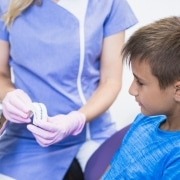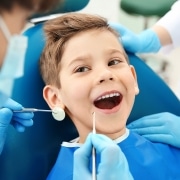Why Does My Child Have Bad Breath?
Halitosis, also known as bad breath, is surprisingly common in children. For parents, bad breath in children can cause anxiety, but once you determine the cause, treatment is available from your Texas dentist.
Poor Oral Hygiene
Poor oral hygiene is one of the most common causes of bad breath in children. Children are notorious for saying they brushed their teeth when they didn’t or just giving a quick brush to one or two teeth and calling it a day. To eliminate this possible cause, supervise your child while they brush for a week and see if the bad breath goes away.
Old Toothbrush
if your child is using an old toothbrush, he or she may be reintroducing bacteria into the mouth every time they brush. Be sure to replace toothbrushes at least once a month.
Dehydration
Drinking plenty of water is very important for the body, but it is also important to keep the mouth moist. A dry mouth can cause bad breath in children. Although you might not think it’s possible for your child to become dehydrated, it’s actually very common. Kids are very active, and they lose bodily fluids at a fast rate due to their fast metabolism. See to it that your child drinks plenty of water—not juice—to ensure they are not dehydrated. If their bad breath goes away, then you’ve found the cause.
Acid Reflux
Children sometimes suffer from acid reflux, a condition in which partially digested food can cause acidification of the digestive tract. Children who get acid reflux may also have difficulty breathing due to a lack of absorption of partially digestible food. If this is a problem for your child, ask your pediatrician if you need to change his diet or receive other treatment for acid reflux.
Enlarged Tonsils
An enlarged adenoid layer in the posterior pharynx can harbor many bacteria that can lead to bad breath. Large tonsils can also be a cause of snoring and sleep apnea, and in severe cases, your child may need to be examined. Your dentist in Texas can easily have a look to see if a visit to a pediatrician is warranted.
If your child suffers from chronic bad breath, the first thing you should do is schedule a visit to your Texas dentist’s office. To book your appointment now, please contact us.


